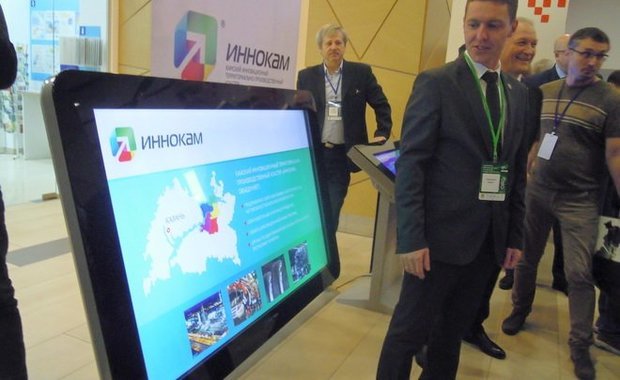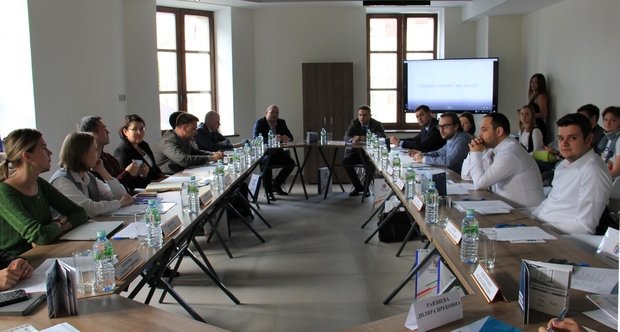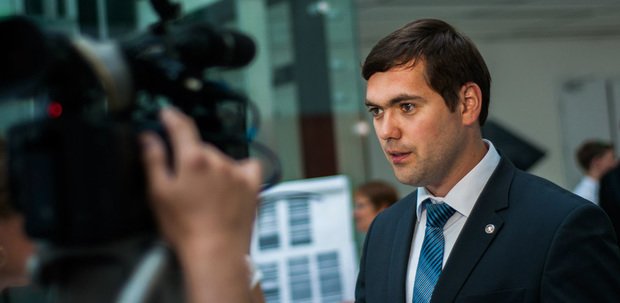''Cluster players don’t have a single development vector''
Development problems of clusters in Tatarstan have been discussed in the Entrepreneur’s House in Kazan
Tatarstan clusters need a special body for a more effective collaboration – a supervisory board. This was the key topic at a meeting of representatives of business, universities and financial institutions. The republic's clusters don't have a single development vector, many participants don't know each other, while some companies don't understand what a cluster policy is at all. It was discussed how to lift these barriers in Entrepreneur's House on 28 May. Realnoe Vremya's correspondent was at the meeting.
SMEs don't understand what clusters are
Representatives of business, universities and financial institutions gathered in Entrepreneur's House in Kazan on 28 May. The first meeting was dedicated to the creation of a supervisory board to control the work of Tatarstan clusters. The Tatarstan Cluster Development and Cooperation of SMEs was the organiser.
''Today Russia doesn't have a practice of creation of a single body that would unite the work of the cluster policy on the territory of the region,'' director of the centre Albert Gaifullin took the floor first and characterised the meeting as a historic event.
According to the social and economic development strategy of the Republic of Tatarstan until 2030, Tatarstan chose a cluster model to develop the economy. It's supposed right such an option is the most effective tool. In 2010, the Russian Ministry of Economic Development began to provide subsidies to regions for creation and work of cluster development to support small and medium-sized businesses. This concept was continued. In 2013, the public body started the support programme of innovative enterprises of clusters. For instance, in Tatarstan, financial flows were sent to Innokam. The cluster has got 688 million rubles from the federal and regional budgets for 3 years. Such a policy became fertile ground to develop clusters. The first associations appeared in Tatarstan in 2014.
IT and mechanical engineering became the pioneer. Companies generated projects, there was financing. However, nowadays subsidising from the federal centre has stopped.
''Money stopped coming. Consequently, small and medium-sized enterprises don't understand what clusters are and what to do with them,'' Gaifullin complained. Disorientation of cluster participants is also a weak link in the cluster model: ''The players don't have a single development vector. Our task is to find gaps and elaborate mechanisms aimed to launch clusterisation despite the economy's complexity,'' the director of the Cluster Development Centre outlined prospects.

Clusters need a supervisory council
After deep analysis, participants of the centre came to a conclusion that they needed to create a new concept.
''We need to create a single body in which business representatives, executives of the company of clusters, financial institutions and the state will be present. It's a classic model when the eco-system, in which everybody communicates, generates a globally competitive product,'' told Albert Gaifullin.
The single body will be called a supervisory council. It will unite not more than 15 representatives of clusters, universities, financial partners and businesses. It was decided to divide the body's activity into four major areas.
The analytic and consulting area will be responsible for the development of cluster projects, accompaniment, ''packaging'', training of employees who manage the companies of clusters.
Promotion of the brand of clusters is the second vector.
''It's very important because often companies are in a cluster but don't know what it is. Of course, nobody has ever heard of the abroad,'' Gaifullin explained.
Facilitation, in other words, moderation, is aimed to improve communication between representatives of different clusters:
''There is such complexity that professionals from different sectors understand each other with some delay. An IT specialist doesn't understand an industrialist, universities have certain complexity in communication with entrepreneurs, etc.,'' said Gaifullin.
As an example, he provided recent research of bitumen done by Kazan State University of Architecture and Engineering. The university created a construction material whose quality is much better than traditional. However, its prime cost is several times expensive than the bitumen used in construction by Suvar Holding.
''Before doing research, we want to receive requests from enterprises. Facilitation of these meetings is precisely aimed at an integrated approach,'' Albert Gaifullin noted.

The fourth area is linked to the attendance of enterprises of clusters by foreign guests:
''Here we will cooperate with the Tatarstan Investment Development Agency. It's an advantage for foreign investors because they are in touch with operating enterprises,'' Gaifullin explained.
As a result of joint work, there will be created an effective cluster policy, outlets expand, a comfortable business environment for all market players is created, the investment climate and business culture will improve. In Gaifullin's opinion, managing companies need to closely and centrally work with enterprises.
''Nowadays it's necessary to put a lot of effort to invite the enterprise to participate in our projects,'' Albert Gaifullin claimed. First of all, it happens because organisations stopped reading newsletters from the managing companies because they don't see any advantage. Disorientation of players is also an important reason.
As a solution of the problem, the Tatarstan Cluster Development Centre decided to attract partners among big companies:
''We invited professionals who deal with the masses, and we want to provide them with money with partners,'' Gaifullin said.
The world's leading robotics manufacturer KUKA Robotics, VTB and NEO Centre is on the preliminary list now.
How eighth grader from Chelny found bug in Google
The University of Talents can solve personnel problems for small and medium-sized enterprises. Its representative Aydar Akmalov was also present at the meeting and told about current problems.
''It's no secret the majority of Olympiad medallists leave Tatarstan, and those who remain leave after graduation from university and find a job outside the republic,'' Akmalov claimed. The task of the University of Talents is to accompany the talented youth of the republic and find them a job. In addition, the job is done from 12 to 30 years.''
Telling about the talented youth of Tatarstan, Aydar Akmalov provided interesting examples about an eighth grader from Naberezhnye Chelny. The teenager develops in IT. He has recently found a mistake in Google's operation:
''The system had a bug when a user could change a company's information. So one could damage any juridical person's reputation if desired,'' Akmalov told. The boy told the company about the lapse. As a result, Google representatives not only corrected the mistake but also invited the schoolboy to Silicon Valley.''

One catalogue and platform for communication
During the discussion of the possibility of cooperation of the TIDA and promotion of clusters abroad, there was offered an idea to create one catalogue of products of cluster participants. It will significantly make it easier for foreign investors to look for partners and add a stimulus to participants to cooperate.
Head of the representative office of NEO Consult in Volga Federal District Albina Koryagina offered to provide analytic research to clusters as cooperation:
''The base will be free but on request and has a reference book,'' the businesswoman specified. Representative of Imagine Group PR agency Anastasia Oshurkova presented a concept that will enable to create a platform for cooperation of clusters.
''The task is to not only gather everybody in one place but also enable participants to know about each other,'' the girl told about goals.
According to her, activity formats are selected in a way that the involvement of participants is maximum. The project includes a bright video invitation, additional communication (badges), networking (platform for business contacts), fast date, facilitation (help in communication) and foresight sessions. The first project is created now for the IT cluster, but projects for other communities are also planned in the future.
In conclusion of the meeting, the director of the Tatarstan Cluster Development Centre made several offers for the participants. In particular, it's necessary to update the roster of active operating participants of the cluster, so that only existing and operating enterprises will remain in the roster. It's also planned to assign a project manager for every cluster for more effective collaboration. And, thirdly, there was expressed a wish to create a council of experts consisting of supervisory board members that will make a decision on distribution of subsidies for clusters in the future.